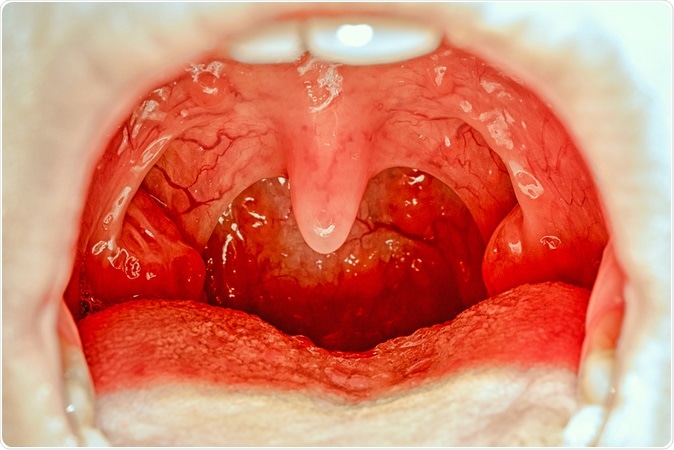A large study has found that removal of the tonsils as a child can mean that the individual is more susceptible to chest infections as an adult. The study appeared in the latest issue of the journal JAMA Otolaryngology Head and Neck Surgery.

Open mouth showing tonsil. Image Credit: Elena11 / Shutterstock
For this study the team of researchers from the University of Melbourne looked at 1.2 million children from Denmark, under the age of nine. The found that the risk of getting upper respiratory tract infections tripled when the tonsils and adenoids were removed. This study emphasized on the importance of long term risks of childhood surgeries. The children were followed up between 1979 and 1999. A total of 60,400 tonsillectomies or adenoidectomies or combined surgeries were performed during this period.
The children who participated in the study were followed up until the age of 30 to determine their long term health risks. According to lead researcher Dr Sean Byars from the University of Melbourne, the tonsils and adenoids play an important role in the immune functions development of the child. There has been little research until now on the long term effects of removal of these organs in a person as a child. The tonsils and the adenoids prevent the entry of bacteria and viruses to the throat and lungs by fighting them off at the gates so to speak, explain researchers. They are usually removed when they are enlarged and they are obstructing the breathing. In children with enlarged tonsils and adenoids there is difficulty in breathing, recurrent chest and respiratory tract infections, tonsillitis, as well as recurrent middle ear infections.
The team noted that while removal of the tonsils tripled the risk of getting upper respiratory tract infections such as rhinitis, bronchitis etc. as an adult, removal of the adenoids doubled the risk of the children to get chronic obstructive pulmonary disorder (COPD) as adults. The risk of asthma and pneumonias were also raised by around 50 percent after these surgeries, they noted. The authors state that these results, “suggest the early life removal [of tonsils and adenoids] may slightly but significantly perturb processes important for later-life health.” Removal of these organs in childhood was also linked to skin and eye health problems especially linked to allergies, they added.
Around 48,000 tonsillectomies and adenoidectomies are performed in Australia and numbers are similar in most other countries. The researchers state that the incidence of tonsillectomies and adenoidectomies that are unnecessary have gone down over the past decade. Nowadays the ones that are performed are usually indicated in the child. The authors suggest that alternatives to surgery should be considered in each case because of the life time risk that removal of these organs can produce. “Risks were significant for many diseases and large for some,” they write. Other experts in the filed have said that more studies on this are needed to come to a definitive conclusion. This is an important study they state, but definitive studies in future would be necessary before children are advised not to undergo tonsillectomies and adenoidectomies, when they needed one.